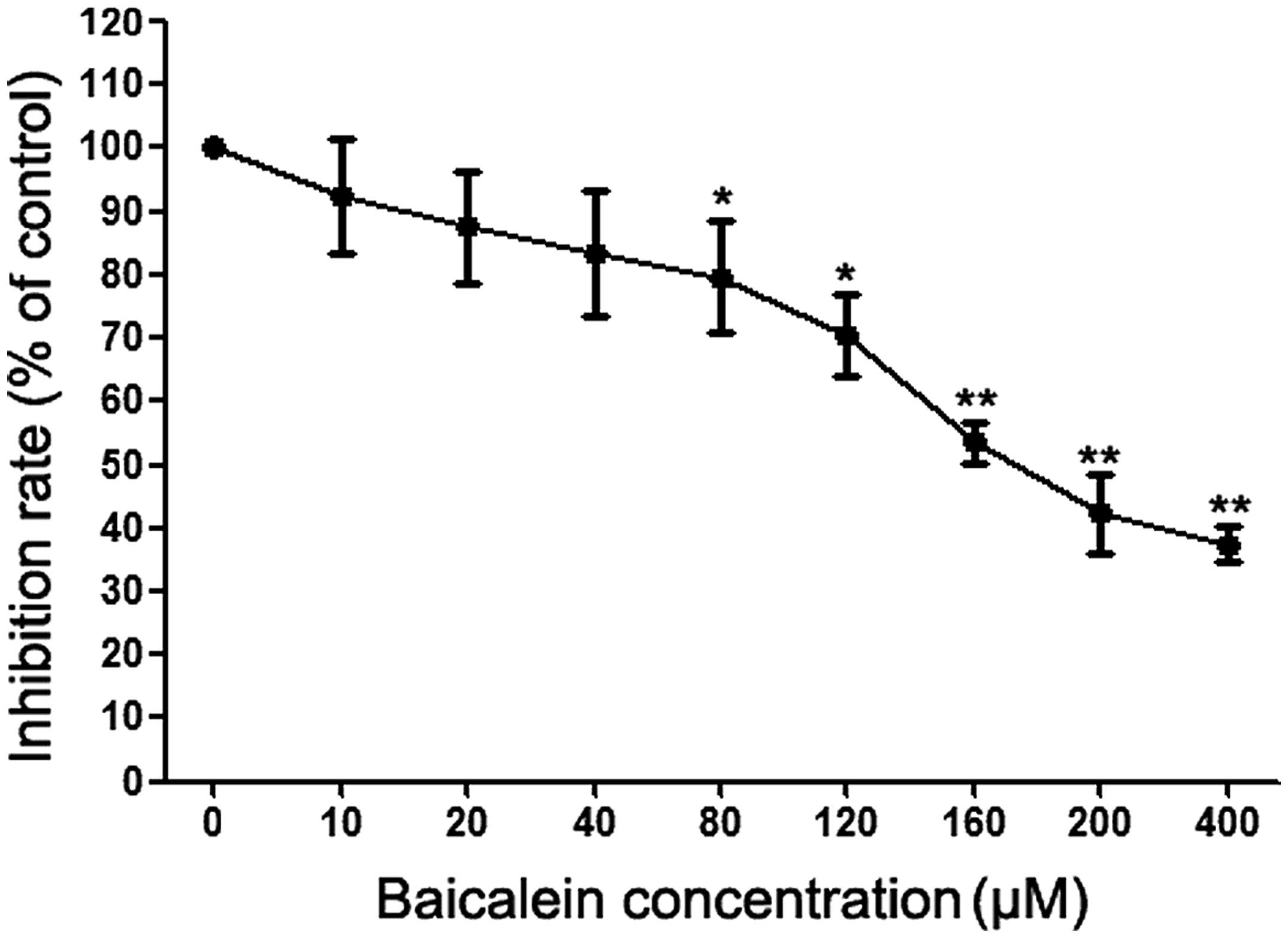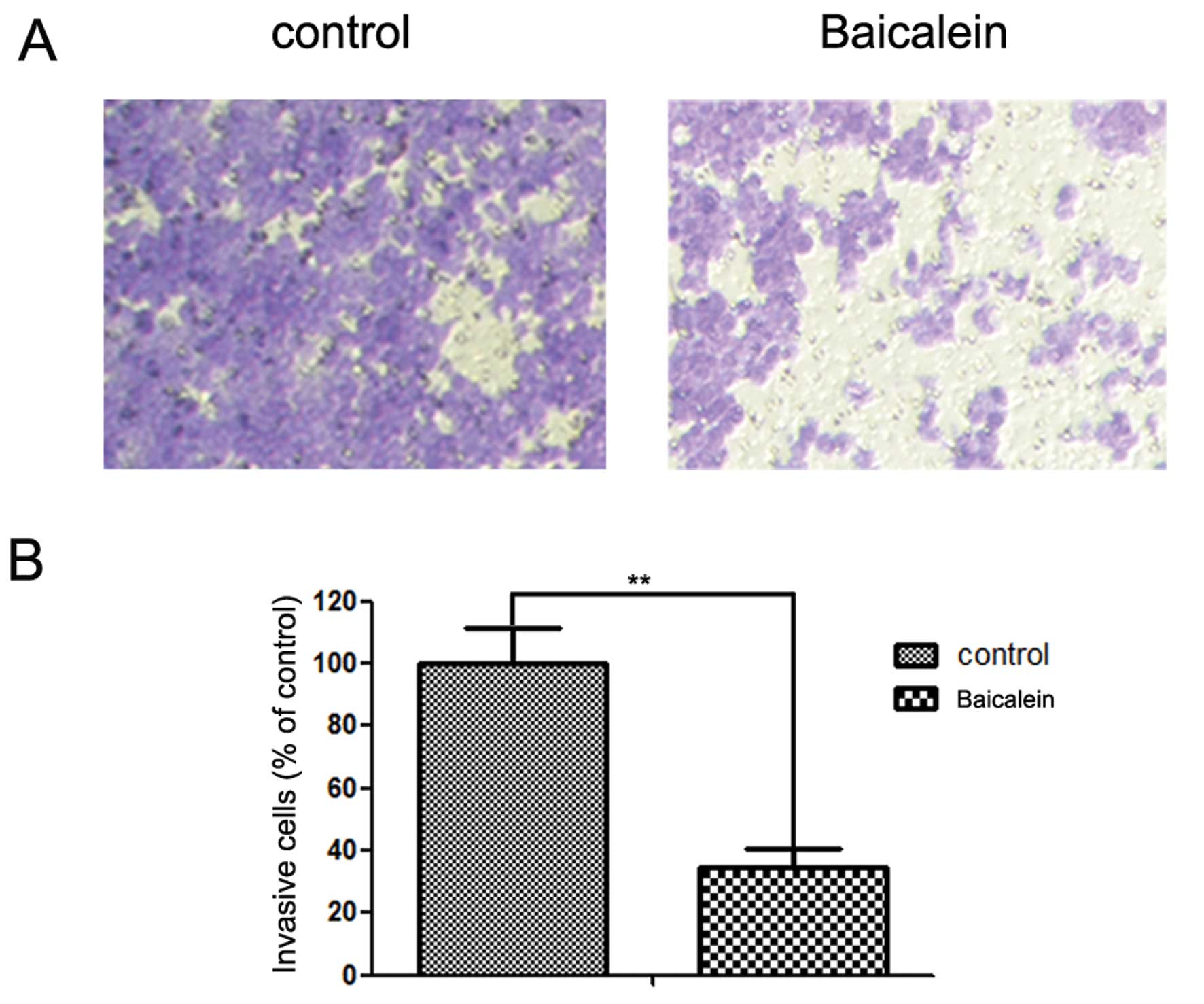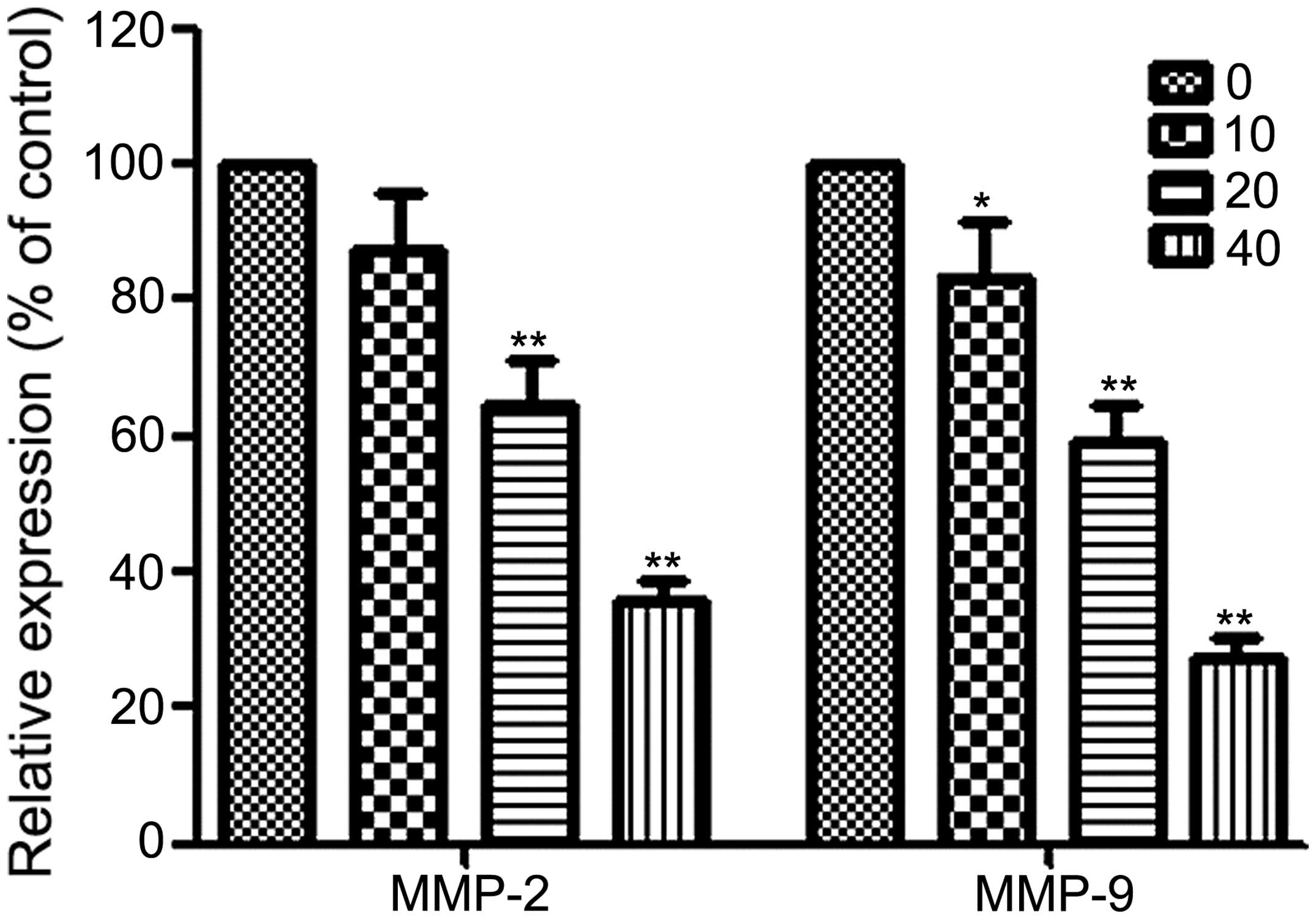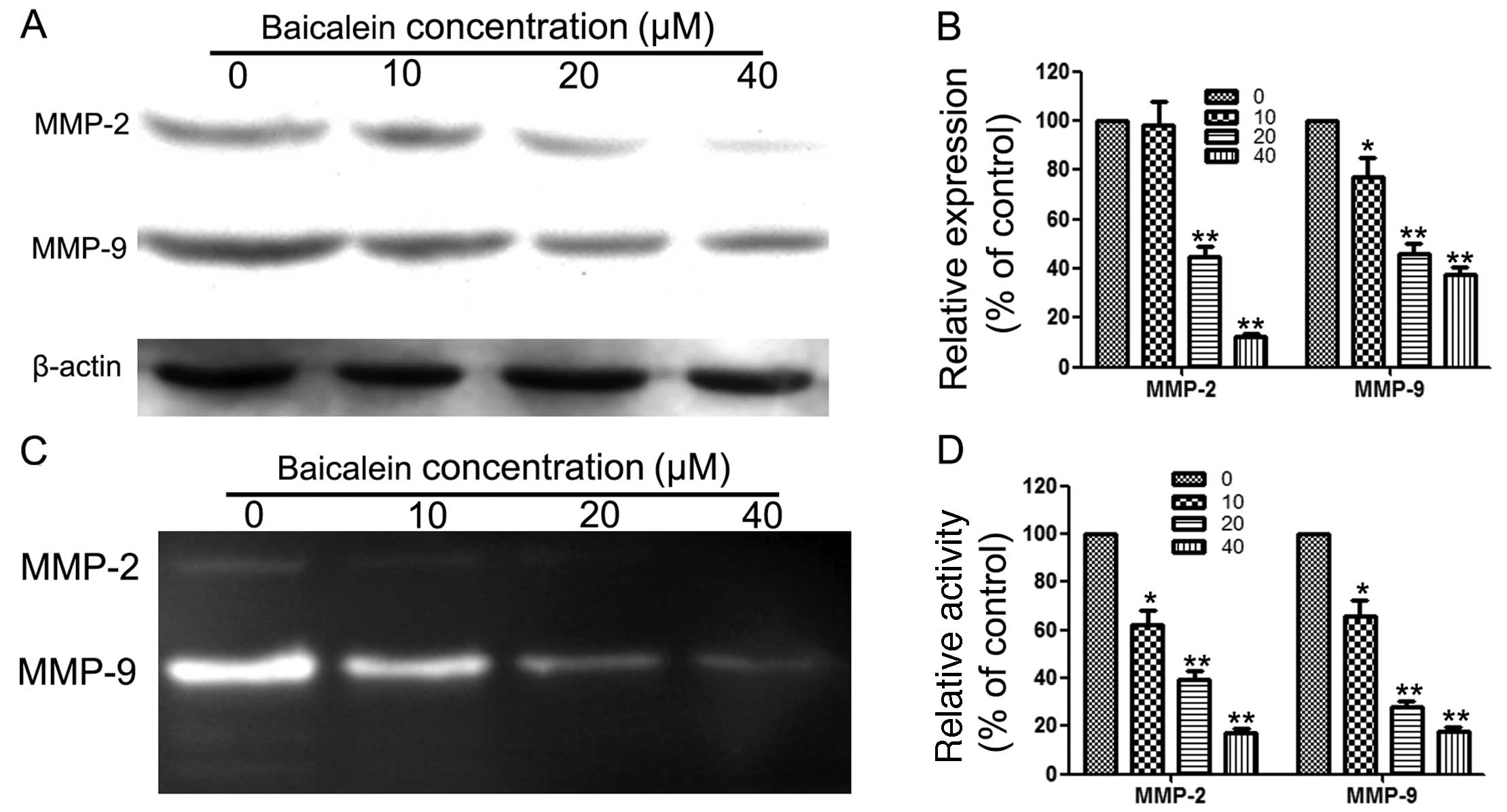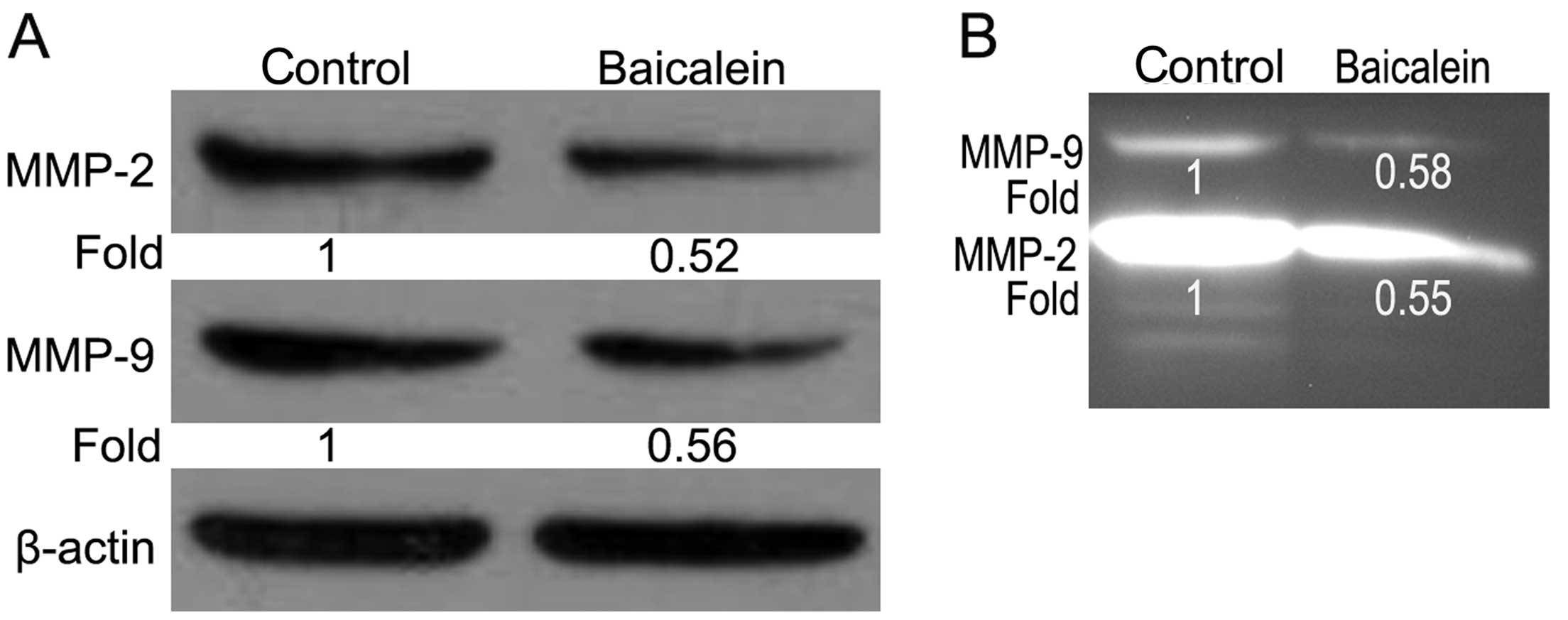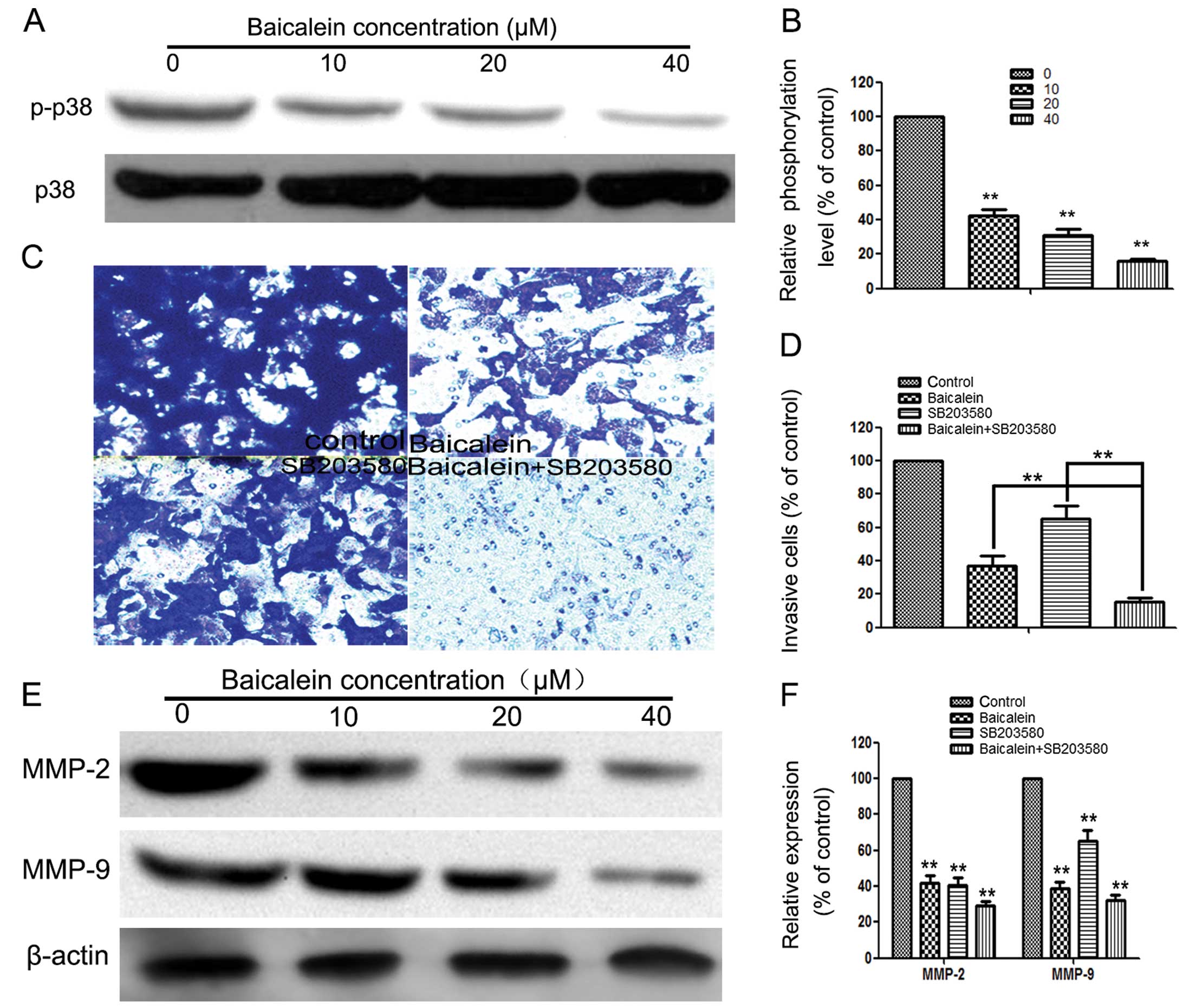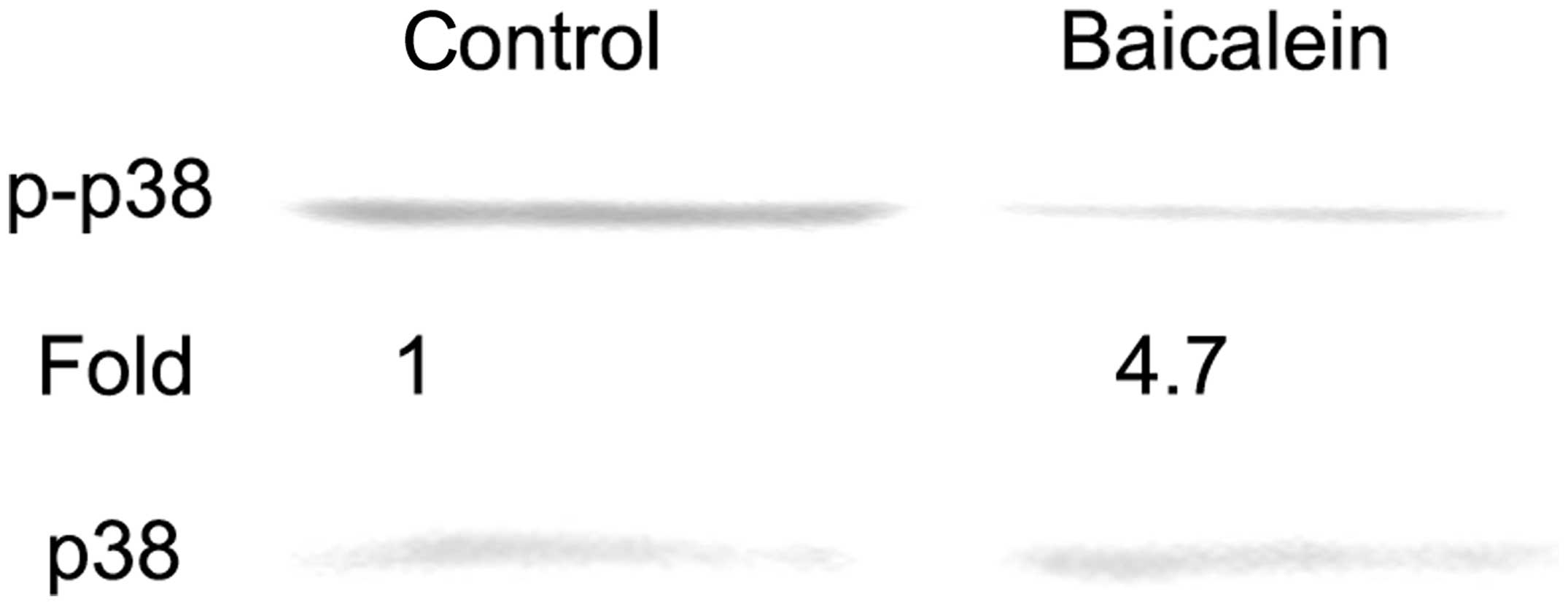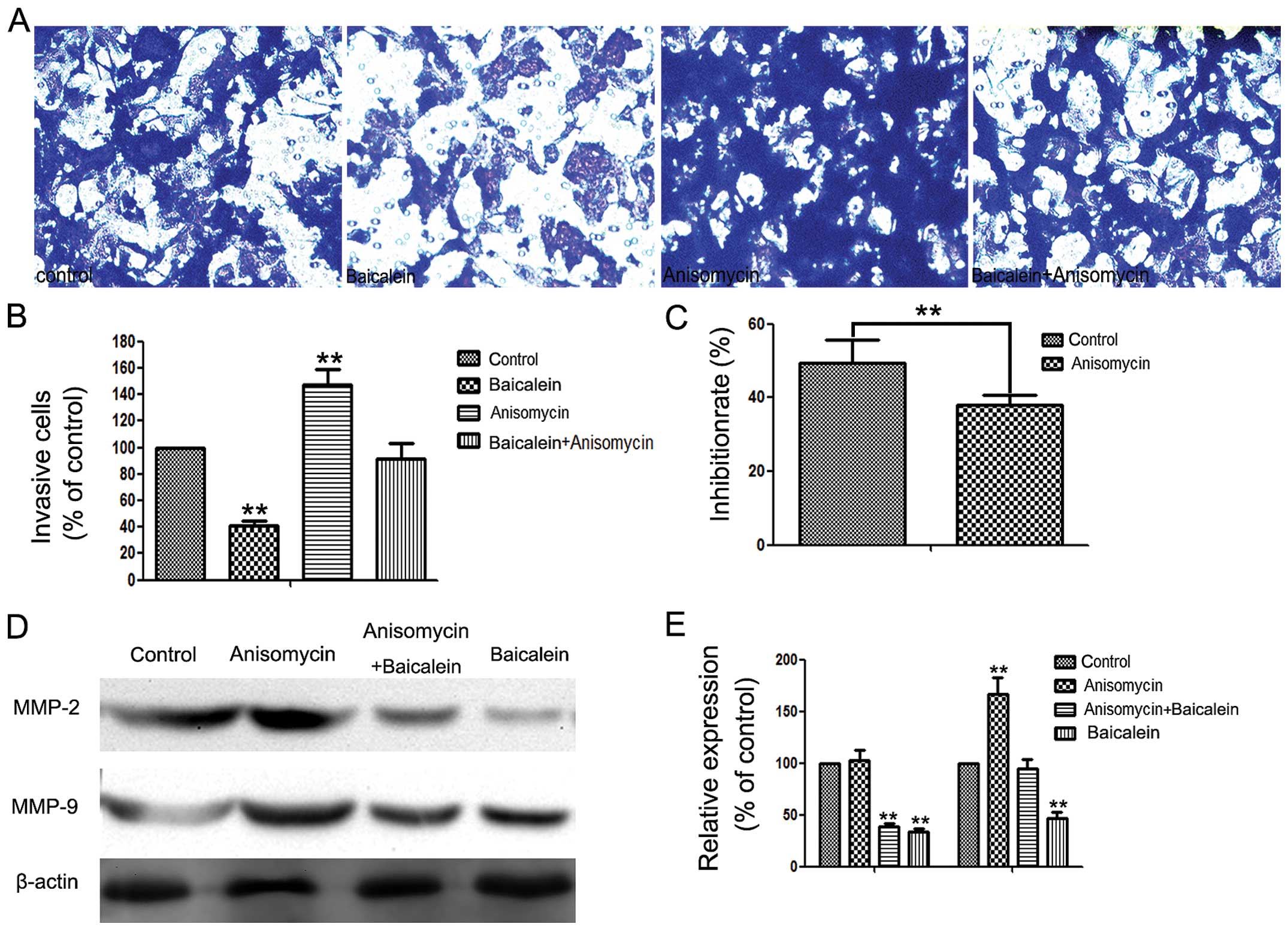Introduction
Gastric cancer is the fourth most commonly diagnosed
cancer and the second leading cause of cancer-related mortality
worldwide (1), leading to thousands
of deaths per year. The potent invasion and metastatic ability of
gastric cancer is one of the key factors that affect poor prognosis
(2). Therefore, it is critical to
detect the underlying mechanisms of the invasion and metastasis of
gastric cancer, and to develop therapeutic treatment for gastric
cancer.
The extracellular matrix (ECM) plays an important
role in tumor development and metastasis (3). Matrix metalloproteinases (MMPs), a
family of Zn2+ containing Ca2+-dependent
proteolytic enzymes, play important roles in degrading basement
membranes and are intricately involved in cancer invasion and
metastasis (4). MAPKs play
important roles in intracellular signaling during proliferation,
differentiation, cellular stress responses and apoptosis (5). Increased activation of p38 signaling
pathway is observed in gastric cancer, and is correlated with the
invasion by regulating the expression of MMPs (6,7).
Baicalein
(5,6,7-trihydroxy-2-phenyl-4H-1-benzopyran-4-one), as one of the
major flavonoids with a defined chemical structure in
Scutellaria baicalensis, has long been used in oriental
medicine. Baicalein has been found to have anticancer effects
(4,8,9).
However, the antimetastatic effects and related mechanism(s) in
gastric cancer cells have not previously been determined. In the
present study, we tested the hypothesis that administration of
baicalein may inhibit the proliferation, motility and invasion of
human gastric cancer cells via the p38 signaling pathway in
vitro.
Materials and methods
Reagents
Fetal bovine serum (FBS), streptomycin and
penicillin were obtained from HyClone. Baicalein, SB203580 and
anisomycin were from Sigma. Anti-p38 MAPK, anti-phospho-p38 MAPK
(Thr180/Tyr182), anti-MMP-2 and anti-MMP-9 antibodies were
purchased from Cell Signaling. Anti-β-actin was purchased from
Santa Cruz.
Cell culture
The human gastric cancer cell lines SGC7901 and
MGC803 were purchased from Type Culture Collection, Chinese Academy
of Sciences (Shanghai, China). The cells were cultured in RPMI-1640
(Invitrogen) supplemented with 10% FBS, 100 U/ml penicillin and 100
μg/ml streptomycin. All cells were incubated at 37°C with 5%
CO2.
Cell viability assays
Cell survival was detected using standard
3-(4,5-dimethylthiazol-2-yl)-2,5-diphenyltetrazolium bromide (MTT)
assay according to the manufacturer’s instructions. First, cells
were seeded in 96-well culture plates (5×104
cells/well). Then, cells were treated with different concentrations
of baicalein. After incubating for 24 h, the cells were washed
twice with PBS and incubated with 5 mg/ml MTT (Sigma) for 4 h.
Finally, the optical density was measured in a microplate reader at
562 nm formazan absorbance.
In vitro invasion and migration
assays
The in vitro invasion and migration activity
was measured according to previously described methods with minor
changes (10,11). Cells were pretreated with 0, 10, 20
and 40 μM baicalein or SB203580 (20 μM) or anisomycin (25 μg/ml)
for 24 h, and surviving cells were harvested and seeded to
Transwell chamber (Corning) then incubated for 24 h at 37°C. Then,
the cells on the upper side of inserts were completely removed by
swabbing, while the cells on the bottom side of the filter were
fixed, stained and measured. For invasion assay, 10 ml Matrigel (25
mg/50 ml; BD Biosciences, Bedford, MA, USA) was applied to 8-mm
pore size polycarbonate membrane filters and the bottom chamber
contained standard medium.
Real-time quantitative PCR
Total RNAs were prepared by using the RNeasy Mini
kit (Invitrogen). cDNA was synthesized with SuperScript III Reverse
Transcriptase (Invitrogen). Real-time quantitative PCR (RT-PCR) was
performed using SYBR-Green II in accordance with the PrimeScript
RT-PCR kit protocol (Takara). Gene-specific primer pairs used for
amplification are shown in Table I.
β-actin was used as an endogenous control. The analysis of the
relative gene copy number data for MMP-2 and −9 was performed using
the 2−ΔΔCt method.
 | Table IPrimers for RT-PCR. |
Table I
Primers for RT-PCR.
| Gene | Forward | Reverse |
|---|
| β-actin |
CCATCGTCCACCGCAAAT |
CATGCCAATCTCATCTTGTTT |
| MMP-2 |
CTCATCGCAGATGCCTGGAA |
TTCAGGTAATAGGCACCCTTGAAGA |
| MMP-9 |
GTCCACCCTTGTGCTCTTCC |
GCCACCCGAGTGTAACCAT |
Gelatin zymography
Following treatment with baicalein for 24 h, samples
of conditioned media were collected. Then, gelatin zymography was
performed as previously described (4). Briefly, appropriate volumes of the
unboiled samples (adjusted by vital cell number) were separated by
0.1% gelatin-8% SDS-PAGE electrophoresis. Then, the gels were
soaked in 2.5% Triton X-100 for three times at room temperature,
once for 30 min, and incubated in reaction buffer (10 mM
CaCl2, 40 mM Tris-HCl and 0.01% NaN3, pH 8.0)
at 37°C for 12 h. Gels were rinsed with distilled water, stained
with Coomassie brilliant blue R-250. The gelatinolytic activities
were quantified and analyzed by an image analysis system (Bio-Rad
Laboratories, Richmond, CA, USA).
Western blot analysis
After treating with baicalein or SB203580 or
anisomycin, proteins were extracted with lysis buffer (40 mmol/l
Tris-HCl, 1 mmol/l EDTA, 150 mmol/l KCl, 100 mmol/l
NaVO3, 1% Triton X-100, 1 mmol/l PMSF, pH 7.5). Then the
proteins were separated by 10% SDS-polyacrylamide gel
electrophoresis and transferred onto PVDF membranes. To block
non-specific binding, membranes were blocked in defatted milk [5%
in Tris-buffered saline with Tween-20 (TBST) buffer] at room
temperature for 1 h and were then incubated with antibodies against
p38 MAPK, p-p38 MAPK, MMP-2, −9 or β-actin overnight at 4°C. The
membranes were then incubated with appropriate second antibodies
for 1 h at room temperature. The bands were detected with an
enhanced chemiluminescence kit (ECL Plus; Amersham, Freiburg,
Germany) and exposed by autoradiography. The densitometric analysis
was performed using ImageJ software (GE Healthcare,
Buckinghamshire, UK).
Statistical analysis
Experiments were repeated three times, and the
results of the studies are expressed as the means ± SD. All
statistical tests and corresponding p-values were two sided.
p<0.05 was considered to indicate a statistically significant
difference. We performed correlation analysis by the Z-test.
Results
Baicalein inhibits the proliferation of
gastric cancer cells
The antiproliferation effects of baicalein at
various concentrations (0–400 μM) on SGC7901 cells are shown in
Fig. 1. At 80 μM, baicalein clearly
inhibited the proliferation of SGC7901 cells, therefore we chose a
concentration range of baicalein lower than this for all subsequent
experiments.
Baicalein inhibits the migration and
invasion of gastric cancer cells
Fig. 2 shows the
effect of baicalein on cell migration and invasion in SGC7901 cells
that were treated with 0, 10, 20 and 40 μM of baicalein for 16 h
(cell migration) and 24 h (cell invasion), respectively. We showed
that baicalein reduced the invasion and migration of SGC7901 cells
substantially in a concentration-dependent manner. Quantification
analysis indicated that the inhibition rate of migration and
invasion were ~24.27, 37.13, 77.48 and 42.43, 68.81, 97.52%,
respectively. Similar antimetastatic effect of baicalein was
observed in MGC803 cells (data shown in Fig. 3).
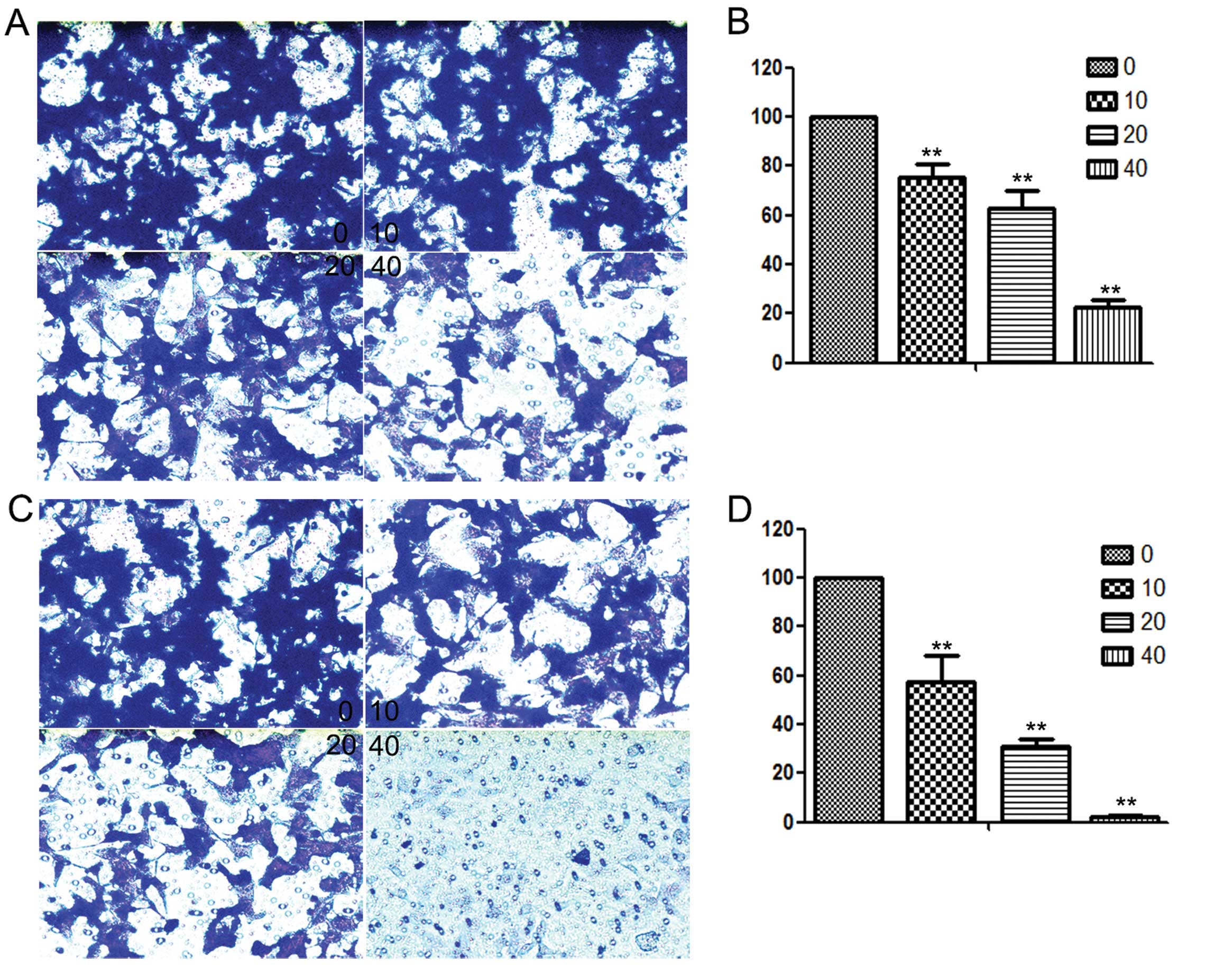 | Figure 2Effects of baicalein on the migration
and invasion of SGC7901 cells. (A) For the migration assay, cells
pre-incubated with various concentrations of baicalein (0, 10, 20
and 40 μM) were plated onto the upper wells of the chamber. FBS
(10%) was added to the lower wells for 24 h to induce cell
migration. After 16 h, cells on the bottom side of the filter were
fixed, stained and measured. Migration was assessed by measuring
area of migrated cells in five microscopic fields/well at ×200
magnification. Cell migration spontaneous migration in DMSO was
designated as control. (B) The percent migration rate was expressed
as a percentage of the control (0 μM). (C) For the invasion assay,
SGC7901 cells were assayed. Cells pre-incubated with various
concentrations of baicalein (0, 10, 20 and 40 μM) were plated onto
the upper wells of the chamber. FBS (10%) was added to the lower
wells for 24 h to induce cell invasion. After 24 h, cells on the
bottom side of the filter were fixed, stained and measured.
Invation was assessed by measuring the area of migrated cells in
five microscopic fields/well at ×200 magnification. Cell migration
spontaneous migration in DMSO was designated as control. (D) The
percent invasion rate was expressed as a percentage of the control
(0 μM). Values represent the means ± SD of three independent
experiments performed in triplicate. **p<0.01
compared with the control group. |
Inhibitory effect of baicalein on the
transcriptional levels of MMP-2 and −9
SGC7901 cells were treated with 0, 10, 20 and 40 μM
baicalein for 24 h and then subjected to RT-PCR. We found that
baicalein significantly reduced the transcriptional levels of MMP-2
and −9 in a concentration-dependent manner (Fig. 4).
Baicalein suppresses the expression and
activity of MMP-2 and −9
The expression and activity of MMP-2 and −9 in
SGC7901 cells that were exposed to different concentrations of
baicalein were examined. Cells were treated with 0, 10, 20 and 40
μM baicalein for 24 h and then subjected to western blotting.
Fig. 5A and B show that baicalein
significantly reduced the protein levels of MMP-2 and −9 in a
concentration-dependent manner compared with the control group.
Gelatin zymography was performed to assess the activity of MMP-2
and −9 in cells treated with various concentrations of baicalein.
As shown by gelatinolytic activity data, baicalein inhibited the
activity of MMP-2 and −9 in a concentration-dependent manner
(Fig. 5C and D). The effect of
baicalein on the expression of MMP-2 and −9 in MGC803 is shown in
Fig. 6.
The p38 signaling pathway is involved in
the antimetastatic mechanism of baicalein
In human gastric cancer cells, activation of p38 is
required for the invasion process and the mechanism is correlated
with proteinases (7,12,13);
thus, we investigated the effect of baicalein on the p38 signaling
pathway in SGC7901 cells. Western blotting showed that baicalein
reduced the phosphorylation of p38 in a concentration-dependent
manner (Fig. 7A and B). Fig. 8 shows the effect of baicalein on the
phosphorylation of p38 in MGC803 cells.
In order to examine whether the inhibitory effect of
baicalein on cell invasion and MMP-2 and −9 expression was
correlated with inhibition of the p38 signaling pathway, SGC7901
cells were pretreated with a p38 inhibitor (SB203580, 20 μM) for 30
min and then incubated in the presence or absence of baicalein for
24 h. The results showed that treatment with SB203580 and baicalein
significantly reduced both cell invasion (Fig. 7C and D) as well as MMP-2 and −9
protein expression (Fig. 7E and
F).
Furthermore, chemical anisomycin, a p38 activator,
was employed to confirm the role of the p38 signaling pathway.
Fig. 9A shows the effects of
anisomycin and baicalein on the invasion of SGC7901 cells.
Quantification analysis indicated that anisomycin was able to
enhance the invasion ability of SGC7901 cells, and anisomycin was
able to reverse the inhibitory effect of baicalein on the invasion
of SGC7901 cells (Fig. 9B and C)
and MMP-2 and −9 protein expression (Fig. 9D and E). These results reveal that
the inhibition of both cell invasion and MMP-2 and −9 expression by
baicalein occurs through the suppression of the p38 signaling
pathway.
Discussion
Gastric cancer is a serious public health problem
worldwide (1), and administration
of the antitumor natural product baicalein has been confirmed in
many types of cancers (14–17). However, the antimetastatic effect
and related mechanism(s) in gastric cancer cells remain unclear. In
the present study, we investigated whether baicalein has
anti-invasive and antimetastatic abilities in gastric cancer cells
in vitro by regulating the expression of MMPs via inhibition
of the p38 signaling pathway. According to our literature search,
this is the first scientific report of the antimetastatic effect of
baicalein on gastric cancer.
In order to elucidate the effect of baicalein on
cell migration and invasion, Transwell chamber assay was performed.
As it has been shown previously that baicalein inhibits the growth
of various human cancer cell types (18), the results showed that baicalein can
significantly inhibit the migration and invasion of gastric cancer
cells at non-toxic doses (<80 μM). These results showed that the
inhibition of invasion by baicalein in SGC7901 cells was not due to
cytotoxicity.
Metastasis is one of the leading causes of
cancer-related mortality among gastric cancer patients. Degradation
of the extracellular matrix (ECM) of blood or lymph vessels is
critical to metastasis, since loss of the ECM allows cancer cells
to invade the blood or lymphatic system and spread to other tissues
and organs (4). MMPs, particularly
MMP-2/−9, are responsible for breaking down the ECM (19,20).
Previous studies found that baicalein could inhibit the expression
of MMP-2/−9 in various types of tumors (21–23).
To clarify the mechanism of action of baicalein on gastric cancer,
we investigated whether the inhibitory effect of baicalein on cell
invasion is through regulation of the expression of MMPs. In the
present study, we found that baicalein could significantly inhibit
the expression and activity of MMP-2/−9 in gastric cancer cells.
These results indicate that the antimetastatic effect of baicalein
on SGC7901 cells was correlated with modulation of MMPs.
The synthesis of proteinases is regulated by
multiple signaling cascades, including the p38 signaling pathway
(22,24,25).
The p38 signaling pathway is widely expressed in various tissues
and has much broader functions physiologically (26). The p38 signaling pathway induces the
expression of MMPs and thereby promotes the degradation of ECM
proteins, which leads to cell invasion (27). A previous study found that baicalein
could inhibit the invasion of cancer cells by reducing the
expression of MMP-2/−9 via regulating the p38 signaling pathway
(22). To further explore the
possible mechanism(s) of baicalein in the inhibition of gastric
cancer invasion, we determined the levels of phosphorylation of p38
in SGC7901 cells. The results showed that the phosphorylation of
p38 in cells treated with baicalein was significantly reduced
relative to that in control cells. Baicalein combined with a p38
inhibitor (SB203580) significantly reduced gastric cancer cell
invasion and was accompanied by downregulation of MMP-2/−9.
However, p38 chemical activator (anisomycin) could block these
effects induced by baicalein, suggesting baicalein directly
downregulates the p38 signaling pathway.
In conclusion, the present study demonstrated the
inhibitory effect of baicalein on the invasion and metastatic
abilities of gastric cancer cells. Furthermore, the decrease in the
expression of MMP-2/−9-induced by baicalein is attributed to an
inhibition of the p38 signaling pathway. This mechanism may
contribute to the inhibition of invasion and metastasis in SGC7901
cells by baicalein. These findings present a new potential
therapeutic application of baicalein in antimetastatic therapy for
gastric cancer.
References
|
1
|
Orditura M, Galizia G, Sforza V, et al:
Treatment of gastric cancer. World J Gastroenterol. 20:1635–1649.
2014. View Article : Google Scholar : PubMed/NCBI
|
|
2
|
Tan B, Li Y, Zhao Q, Fan L, Wang D and Liu
Y: Inhibition of gastric cancer cell growth and invasion through
siRNA-mediated knockdown of guanine nucleotide exchange factor
Vav3. Tumour Biol. 35:1481–1488. 2013. View Article : Google Scholar : PubMed/NCBI
|
|
3
|
Kumar A, El-Osta A, Hussain AA and
Marshall J: Increased sequestration of matrix metalloproteinases in
ageing human Bruch’s membrane: implications for ECM turnover.
Invest Ophthalmol Vis Sci. 51:2664–2670. 2010. View Article : Google Scholar : PubMed/NCBI
|
|
4
|
Chen K, Zhang S, Ji Y, et al: Baicalein
inhibits the invasion and metastatic capabilities of hepatocellular
carcinoma cells via down-regulation of the ERK pathway. PLoS One.
8:e729272013. View Article : Google Scholar : PubMed/NCBI
|
|
5
|
Chang L and Karin M: Mammalian MAP kinase
signalling cascades. Nature. 410:37–40. 2001. View Article : Google Scholar : PubMed/NCBI
|
|
6
|
Ou JM, Ye B, Qiu MK, et al: Knockdown of
Livin inhibits growth and invasion of gastric cancer cells through
blockade of the MAPK pathway in vitro and in vivo. Int J Oncol.
44:276–284. 2014.
|
|
7
|
Huang Q, Lan F, Wang X, et al:
IL-1β-induced activation of p38 promotes metastasis in gastric
adenocarcinoma via upregulation of AP-1/c-fos, MMP2 and MMP9. Mol
Cancer. 13:182014. View Article : Google Scholar
|
|
8
|
Chen J, Li Z, Chen AY, et al: Inhibitory
effect of baicalin and baicalein on ovarian cancer cells. Int J Mol
Sci. 14:6012–6025. 2013. View Article : Google Scholar : PubMed/NCBI
|
|
9
|
Li HL, Zhang S, Wang Y, et al: Baicalein
induces apoptosis via a mitochondrial-dependent caspase activation
pathway in T24 bladder cancer cells. Mol Med Rep. 7:266–270.
2013.
|
|
10
|
Liu B, Wang G, Yang J, Pan X, Yang Z and
Zang L: Berberine inhibits human hepatoma cell invasion without
cytotoxicity in healthy hepatocytes. PLoS One. 6:e214162011.
View Article : Google Scholar : PubMed/NCBI
|
|
11
|
Yang SF, Yang WE, Kuo WH, Chang HR, Chu SC
and Hsieh YS: Antimetastatic potentials of flavones on oral cancer
cell via an inhibition of matrix-degrading proteases. Arch Oral
Biol. 53:287–294. 2008. View Article : Google Scholar
|
|
12
|
Lee KH and Kim JR: Kiss-1 suppresses MMP-9
expression by activating p38 MAP kinase in human stomach cancer.
Oncol Res. 18:107–116. 2009. View Article : Google Scholar
|
|
13
|
Kwon CH, Moon HJ, Park HJ, Choi JH and
Park do Y: S100A8 and S100A9 promotes invasion and migration
through p38 mitogen-activated protein kinase-dependent NF-κB
activation in gastric cancer cells. Mol Cells. 35:226–234. 2013.
View Article : Google Scholar : PubMed/NCBI
|
|
14
|
Mondal S, Bandyopadhyay S, Ghosh MK,
Mukhopadhyay S, Roy S and Mandal C: Natural products: promising
resources for cancer drug discovery. Anticancer Agents Med Chem.
12:49–75. 2012. View Article : Google Scholar
|
|
15
|
Chandrashekar N, Selvamani A, Subramanian
R, Pandi A and Thiruvengadam D: Baicalein inhibits pulmonary
carcinogenesis-associated inflammation and interferes with COX-2,
MMP-2 and MMP-9 expressions in-vivo. Toxicol Appl Pharmacol.
261:10–21. 2012. View Article : Google Scholar : PubMed/NCBI
|
|
16
|
Wu B, Li J, Huang D, et al: Baicalein
mediates inhibition of migration and invasiveness of skin carcinoma
through Ezrin in A431 cells. BMC Cancer. 11:5272011. View Article : Google Scholar : PubMed/NCBI
|
|
17
|
Wang ZD, Huang C, Li ZF, et al:
Chrysanthemum indicum ethanolic extract inhibits invasion of
hepatocellular carcinoma via regulation of MMP/TIMP balance as
therapeutic target. Oncol Rep. 23:413–421. 2010.PubMed/NCBI
|
|
18
|
Li-Weber M: New therapeutic aspects of
flavones: the anticancer properties of Scutellaria and its main
active constituents Wogonin, Baicalein and Baicalin. Cancer Treat
Rev. 35:57–68. 2009. View Article : Google Scholar
|
|
19
|
Park SY, Kim JH, Lee YJ, Lee SJ and Kim Y:
Surfactin suppresses TPA-induced breast cancer cell invasion
through the inhibition of MMP-9 expression. Int J Oncol.
42:287–296. 2013.
|
|
20
|
Deng W, Sui H, Wang Q, et al: A Chinese
herbal formula, Yi-Qi-Fu-Sheng, inhibits migration/invasion of
colorectal cancer by down-regulating MMP-2/9 via inhibiting the
activation of ERK/MAPK signaling pathways. BMC Complement Altern
Med. 13:652013. View Article : Google Scholar : PubMed/NCBI
|
|
21
|
Wang L, Ling Y, Chen Y, et al: Flavonoid
baicalein suppresses adhesion, migration and invasion of MDA-MB-231
human breast cancer cells. Cancer Lett. 297:42–48. 2010. View Article : Google Scholar : PubMed/NCBI
|
|
22
|
Zhang Z, Lv J, Lei X, et al: Baicalein
reduces the invasion of glioma cells via reducing the activity of
p38 signaling pathway. PLoS One. 9:e903182014. View Article : Google Scholar : PubMed/NCBI
|
|
23
|
Zhang Y, Song L, Cai L, Wei R, Hu H and
Jin W: Effects of baicalein on apoptosis, cell cycle arrest,
migration and invasion of osteosarcoma cells. Food Chem Toxicol.
53:325–333. 2013. View Article : Google Scholar
|
|
24
|
Kim JM, Noh EM, Kim MS, et al: Decursin
prevents TPA-induced invasion through suppression of
PKCα/p38/NF-κB-dependent MMP-9 expression in MCF-7 human breast
carcinoma cells. Int J Oncol. 44:1607–1613. 2014.PubMed/NCBI
|
|
25
|
del Barco Barrantes I and Nebreda AR:
Roles of p38 MAPKs in invasion and metastasis. Biochem Soc Trans.
40:79–84. 2012. View Article : Google Scholar : PubMed/NCBI
|
|
26
|
Wang ZS, Luo P, Dai SH, Liu ZB, Zheng XR
and Chen T: Salvianolic acid B induces apoptosis in human glioma
U87 cells through p38-mediated ROS generation. Cell Mol Neurobiol.
33:921–928. 2013. View Article : Google Scholar : PubMed/NCBI
|
|
27
|
Acha O, Hernández JL, Penado S, Cano M and
Riancho JA: Risk factors and stroke among patients of different
ages. Rev Clin Esp. 203:189–192. 2003.(In Spanish). View Article : Google Scholar : PubMed/NCBI
|















